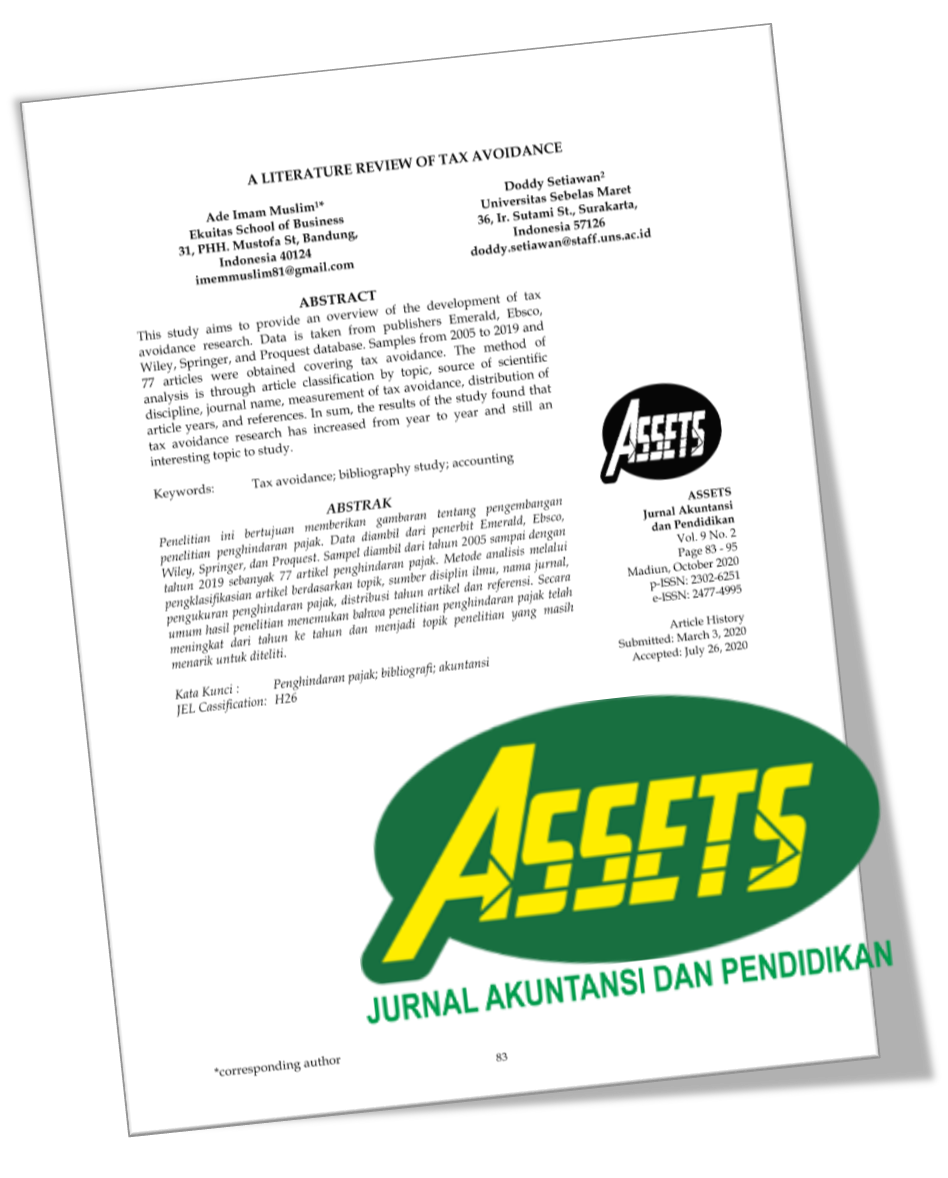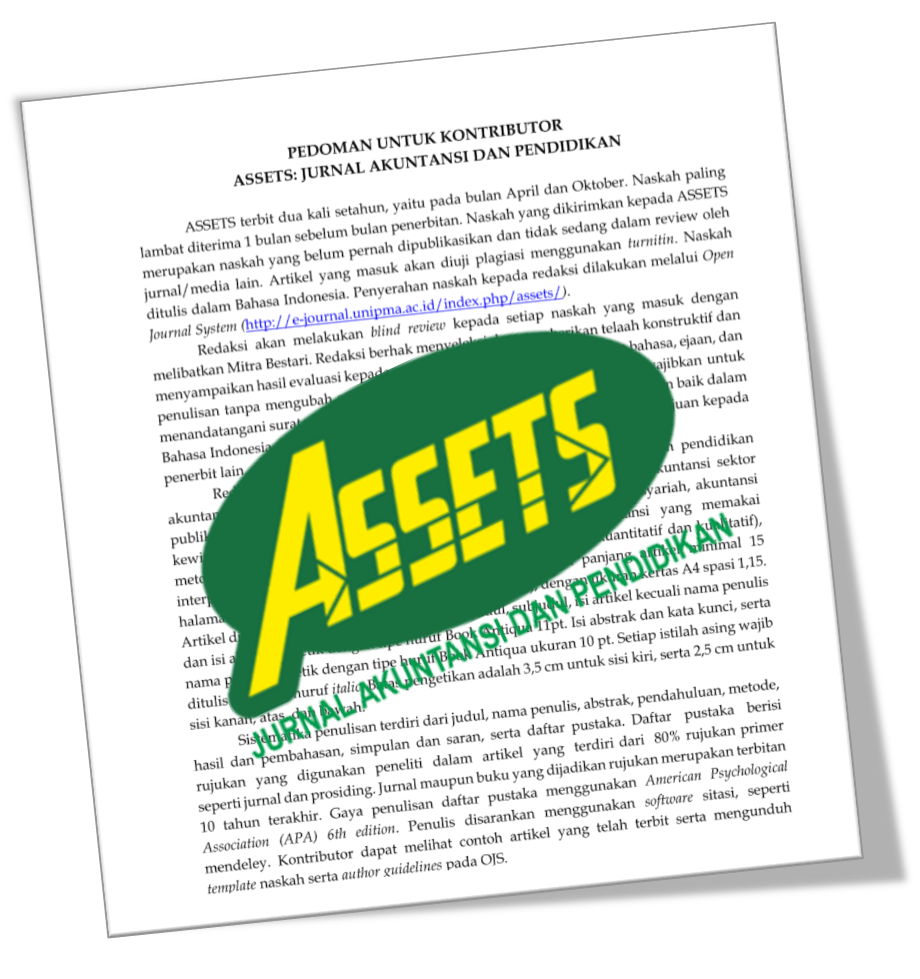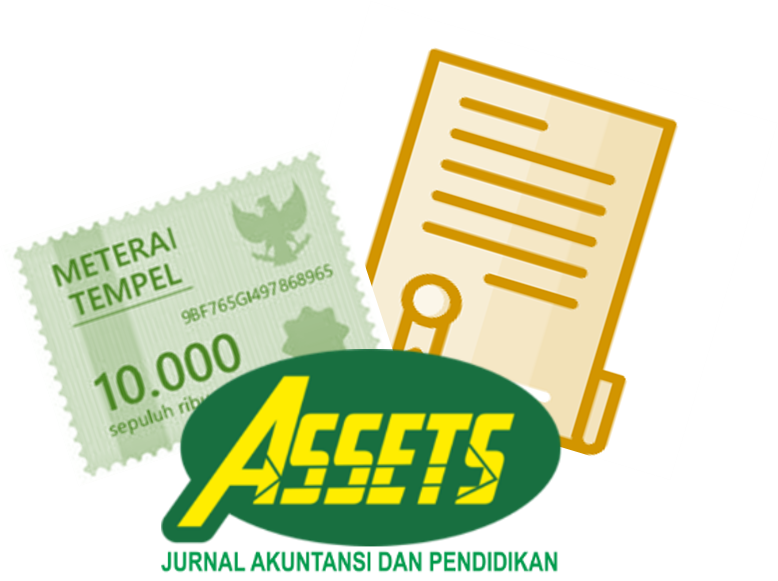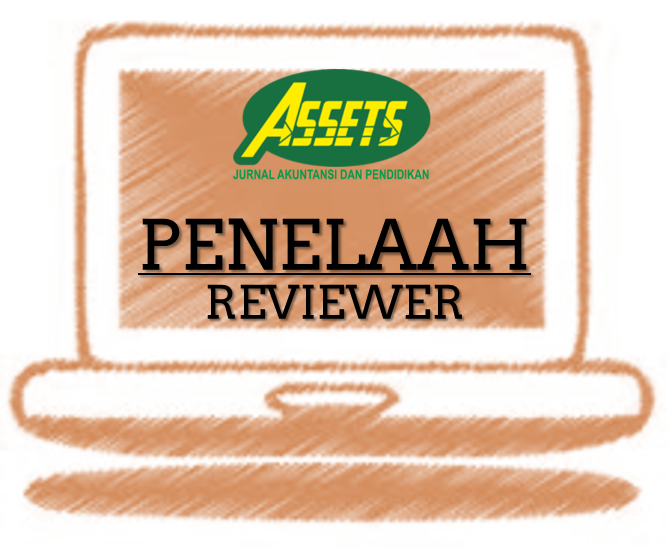A Literature Review of Tax Avoidance
Abstract
ABSTRACT
This study aims to provide an overview of the development of tax avoidance research. Data is taken from publishers Emerald, Ebsco, Wiley, Springer, and Proquest database. Samples from 2005 to 2019 and 77 articles were obtained covering tax avoidance. The method of analysis is through article classification by topic, source of scientific discipline, journal name, measurement of tax avoidance, distribution of article years, and references. In sum, the results of the study found that tax avoidance research has increased from year to year and still an interesting topic to study.
ABSTRAK
Penelitian ini bertujuan memberikan gambaran tentang pengembangan penelitian penghindaran pajak. Data diambil dari penerbit Emerald, Ebsco, Wiley, Springer, dan Proquest. Sampel diambil dari tahun 2005 sampai dengan tahun 2019 sebanyak 77 artikel penghindaran pajak. Metode analisis melalui pengklasifikasian artikel berdasarkan topik, sumber disiplin ilmu, nama jurnal, pengukuran penghindaran pajak, distribusi tahun artikel dan referensi. Secara umum hasil penelitian menemukan bahwa penelitian penghindaran pajak telah meningkat dari tahun ke tahun dan menjadi topik penelitian yang masih menarik untuk diteliti.
Keywords
Full Text:
PDFReferences
Adeyani, V. A., & Winnie. (2016). The Effect of Good Corporate Governance on Tax Avoidance: An Empirical Study on Manufacturing Companies Listed in IDX. Asian Journal of Accounting Research, 1(1), 28–38. https://doi.org/10.1108/AJAR-2016-01-01-B004
Agnes Cheng, C. S., Huang, H. H., Li, Y., & Stanfield, J. (2012). The effect of hedge fund activism on corporate tax avoidance. Accounting Review, 87(5), 1493–1526. https://doi.org/10.2308/accr-50195
Armstrong, C. S., Blouin, J. L., Jagolinzer, A. D., & Larcker, D. F. (2015). Corporate governance, incentives, and tax avoidance. Journal of Accounting and Economics. https://doi.org/10.1016/j.jacceco.2015.02.003
Badertscher, B. A., Katz, S. P., & Rego, S. O. (2013). The separation of ownership and control and corporate tax avoidance. Journal of Accounting and Economics, 56(2–3), 228–250. https://doi.org/10.1016/j.jacceco.2013.08.005
Baldvinsdottir, G., Hagberg, A., Johansson, I. L., Jonäll, K., & Marton, J. (2011). Accounting research and trust: A literature review. Qualitative Research in Accounting and Management, 8(4), 382–424. https://doi.org/10.1108/11766091111189891
Bandyopadhyay, S. P., Chen, C., Huang, A. G., & Jha, R. (2010). Accounting conservatism and the temporal trends in current earnings’ ability to predict future cash flows versus future earnings: Evidence on the trade-off between relevance and reliability. Contemporary Accounting Research, 27(2), 413–460. https://doi.org/10.1111/j.1911-3846.2010.01013.x
Bauer, A. M. (2016). Tax Avoidance and the Implications of Weak Internal Controls. Contemporary Accounting Research, 33(2), 449–486. https://doi.org/10.1111/1911-3846.12151
Blaufus, K., Möhlmann, A., & Schwäbe, A. N. (2019). Stock price reactions to news about corporate tax avoidance and evasion. Journal of Economic Psychology, 72, 278–292. https://doi.org/10.1016/j.joep.2019.04.007
Boone, J. P., Khurana, I. K., & Raman, K. K. (2013). Religiosity and tax avoidance. Journal of the American Taxation Association, 35(1), 53–84. https://doi.org/10.2308/atax-50341
Chen, S., Chen, X., Cheng, Q., & Shevlin, T. (2010). Are family firms more or less tax aggressive ? *. Journal of Financial Economics, 91(2), 1–56.
Chircop, J., Fabrizi, M., Ipino, E., & Parbonetti, A. (2018). Does social capital constrain firms’ tax avoidance? Social Responsibility Journal, 14(3), 542–565. https://doi.org/10.1108/SRJ-08-2017-0157
Chyz, J. A. (2013). Personally tax aggressive executives and corporate tax sheltering. Journal of Accounting and Economics, 56(2–3), 311–328. https://doi.org/10.1016/j.jacceco.2013.09.003
Desai, M. A., & Dharmapala, D. (2006). Corporate tax avoidance and high-powered incentives. Journal of Financial Economics, 79(1), 145–179. https://doi.org/10.1016/j.jfineco.2005.02.002
Donohoe, M. P., & Robert Knechel, W. (2014). Does corporate tax aggressiveness influence audit pricing? Contemporary Accounting Research, 31(1), 284–308. https://doi.org/10.1111/1911-3846.12027
Dyreng, S. D., Hanlon, M., & Maydew, E. L. (2010). The effects of executives on corporate tax avoidance. Accounting Review, 85(4), 1163–1189. https://doi.org/10.2308/accr.2010.85.4.1163
Evertsson, N. (2016). Is the top leadership of the organizations promoting tax avoidance? Journal of Financial Crime, 23(2), 273–288. https://doi.org/10.1108/JFC-06-2014-0028
Frank, M. M., Lynch, L. J., & Rego, S. O. (2009). Tax reporting aggressiveness and its relation to aggressive financial reporting. Accounting Review, 84(2), 467–496. https://doi.org/10.2308/accr.2009.84.2.467
Gaaya, S., Lakhal, N., & Lakhal, F. (2017). Does family ownership reduce corporate tax avoidance? The moderating effect of audit quality. Managerial Auditing Journal, 32(7), 731–744. https://doi.org/10.1108/MAJ-02-2017-1530
Gaertner, F. B. (2014). CEO After-Tax Compensation Incentives and Corporate Tax Avoidance. Contemporary Accounting Research, 31(4), 1077–1102. https://doi.org/10.1111/1911-3846.12058
Gallemore, J., Maydew, E. L., & Thornock, J. R. (2014). The Reputational Costs of Tax Avoidance. Contemporary Accounting Research, 31(4), 1103–1133. https://doi.org/10.1111/1911-3846.12055
Gao, L., Yang, L. L., & Zhang, J. H. (2016). Corporate patents, R&D success, and tax avoidance. Review of Quantitative Finance and Accounting, 47(4), 1063–1096. https://doi.org/10.1007/s11156-015-0531-3
Goh, B. W., Lee, J., Lim, C. Y., & Shevlin, T. (2016). The effect of corporate tax avoidance on the cost of equity. Accounting Review, 91(6), 1647–1670. https://doi.org/10.2308/accr-51432
Gul, F. A., Khedmati, M., & Shams, S. M. M. (2018). Managerial acquisitiveness and corporate tax avoidance. Pacific Basin Finance Journal. https://doi.org/10.1016/j.pacfin.2018.08.010
Hanlon, M., & Heitzman, S. (2010). A review of tax research. Journal of Accounting and Economics, 50(2–3), 127–178. https://doi.org/10.1016/j.jacceco.2010.09.002
Hasan, I., Hoi, C. K. S., Wu, Q., & Zhang, H. (2017). Does Social Capital Matter in Corporate Decisions? Evidence from Corporate Tax Avoidance. Journal of Accounting Research, 55(3), 629–668. https://doi.org/10.1111/1475-679X.12159
Herawati, N., & Bandi, B. (2017). Dua Puluh Tahun Riset Perpajakan dalam Akuntansi: Suatu Studi Bibliografi. Jurnal Akuntansi Dan Keuangan, 19(2), 102–121. https://doi.org/10.9744/jak.19.2.102-121
Hoseini, Safari Gerayli, M., & Valiyan, H. (2019). Demographic characteristics of the board of directors’ structure and tax avoidance: Evidence from Tehran Stock Exchange. International Journal of Social Economics, 46(2), 199–212. https://doi.org/10.1108/IJSE-11-2017-0507
Huang, H., Sun, L., & Zhang, J. (2017). Environmental uncertainty and tax avoidance. Advances in Taxation, 24, 83–124. https://doi.org/10.1108/S1058-749720170000024002
Huseynov, F., & Klamm, B. K. (2012). Tax avoidance, tax management and corporate social responsibility. Journal of Corporate Finance, 18(4), 804–827. https://doi.org/10.1016/j.jcorpfin.2012.06.005
Kim, J. B., Li, Y., & Zhang, L. (2011). Corporate tax avoidance and stock price crash risk: Firm-level analysis. Journal of Financial Economics, 100(3), 639–662. https://doi.org/10.1016/j.jfineco.2010.07.007
Kovermann, J., & Velte, P. (2019). The impact of corporate governance on corporate tax avoidance—A literature review. Journal of International Accounting, Auditing and Taxation, 100270. https://doi.org/10.1016/j.intaccaudtax.2019.100270
Kubick, T. R., Lockhart, G. B., Mills, L. F., & Robinson, J. R. (2017). IRS and corporate taxpayer effects of geographic proximity. Journal of Accounting and Economics, 63(2–3), 428–453. https://doi.org/10.1016/j.jacceco.2016.09.005
Laguir, I., Staglianò, R., & Elbaz, J. (2015). Does corporate social responsibility affect corporate tax aggressiveness? Journal of Cleaner Production, 107, 662–675. https://doi.org/10.1016/j.jclepro.2015.05.059
Lanis, R., & Richardson, G. (2012). Corporate social responsibility and tax aggressiveness: An empirical analysis. Journal of Accounting and Public Policy, 31(1), 86–108. https://doi.org/10.1016/j.jaccpubpol.2011.10.006
Lanis, R., & Richardson, G. (2015). Is Corporate Social Responsibility Performance Associated with Tax Avoidance? Journal of Business Ethics, 127(2), 439–457. https://doi.org/10.1007/s10551-014-2052-8
Law, K. K. F., & Mills, L. F. (2017). Military experience and corporate tax avoidance. In Review of Accounting Studies (Vol. 22). https://doi.org/10.1007/s11142-016-9373-z
Manzon, G. B., & Plesko, G. A. (2001). The relation between financial and tax reporting measures of income. Tax Law Review, 55(2), 175–214.
Minnick, K., & Noga, T. (2010). Do corporate governance characteristics influence tax management? Journal of Corporate Finance, 16(5), 703–718. https://doi.org/10.1016/j.jcorpfin.2010.08.005
Neuman, S. S., Omer, T. C., & Shelley, M. K. (2012). Corporate Transparency, Uncertain Tax Activities, and Sustainable Tax Strategies. SSRN Electronic Journal. https://doi.org/10.2139/ssrn.2184892
Oktavia, O., Siregar, S. V., Wardhani, R., & Rahayu, N. (2019). The role of country tax environment on the relationship between financial derivatives and tax avoidance. Asian Journal of Accounting Research. https://doi.org/10.1108/ajar-01-2019-0009
Rego, S. O., & Wilson, R. (2012). Equity Risk Incentives and Corporate Tax Aggressiveness. Journal of Accounting Research, 50(3), 775–810. https://doi.org/10.1111/j.1475-679X.2012.00438.x
Richardson, G., Lanis, R., & Taylor, G. (2015). Financial distress, outside directors and corporate tax aggressiveness spanning the global financial crisis: An empirical analysis. Journal of Banking and Finance, 52, 112–129. https://doi.org/10.1016/j.jbankfin.2014.11.013
Richardson, G., Taylor, G., & Lanis, R. (2015). The impact of financial distress on corporate tax avoidance spanning the global financial crisis: Evidence from Australia. Economic Modelling, 44, 44–53. https://doi.org/10.1016/j.econmod.2014.09.015
Rohlin, S., Rosenthal, S. S., & Ross, A. (2014). Tax avoidance and business location in a state border model. Journal of Urban Economics, 83, 34–49. https://doi.org/10.1016/j.jue.2014.06.003
Salehi, M., Ali Mirzaee, M., & Yazdani, M. (2017). Spiritual and emotional intelligences, financial performance, tax avoidance and corporate disclosure quality in Iran. International Journal of Law and Management, 59(2), 237–256. https://doi.org/10.1108/IJLMA-11-2015-0059
Tang, T. Y. H. (2019). The Value Implications of Tax Avoidance Across Countries. Journal of Accounting, Auditing & Finance, 34(4), 615–638. https://doi.org/10.1177/0148558x17742821
Wilson, R. J. (2009). An Examination of Corporate Tax Shelter Participants The University of Iowa. The Accounting Review, 84(3), 969–999. https://doi.org/10.2308/accr.2009.84.3.969
Xia, C., Cao, C., & Chan, K. C. (2017). Social trust environment and firm tax avoidance: Evidence from China. North American Journal of Economics and Finance, 42, 374–392. https://doi.org/10.1016/j.najef.2017.07.013
Zeng, T. (2019). Relationship between corporate social responsibility and tax avoidance: international evidence. Social Responsibility Journal, 15(2), 244–257. https://doi.org/10.1108/SRJ-03-2018-0056
Article Metrics
Abstract has been read : 4598 timesPDF file viewed/downloaded: 0 times
DOI: http://doi.org/10.25273/jap.v9i2.6112
Refbacks
- There are currently no refbacks.
Copyright (c) 2020 Ade Imam Muslim, Doddy Setiawan

This work is licensed under a Creative Commons Attribution-ShareAlike 4.0 International License.
ASSETS: Jurnal Akuntansi dan Pendidikan is supported by
ASSETS: Jurnal Akuntansi dan Pendidikan is indexed by
| | | ||||
| | | | |

ASSETS: Jurnal Akuntansi dan Pendidikan is licensed under a Creative Commons Attribution-ShareAlike 4.0 International License.











